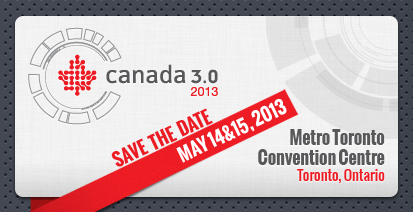-
@can3_0
#CDA30

Program & Schedule
Canada 3.0 is your opportunity to celebrate Canadian leadership in digital media, from industry to academia, government to the arts. Learn more about the forum, the schedule, speakers, streams and this year’s student program.

Partners & Sponsors
Canada 3.0 is made possible through the generous support of our partners and sponsors. Learn more about the organizations that make Canada 3.0 the country’s premier digital forum.
Will Software Engineers Be Replaced by AI? A Balanced View
You're seeing AI transform industries, and software development is no exception. It’s natural to wonder if your job as a software engineer might be on the line. While AI automates some tasks, it also opens up new ways for you to work. The reality isn’t as simple as replacement—or security. Before making up your mind, consider how the role of a software engineer is actually changing in this shifting landscape.
What Is Artificial Intelligence and How Does It Work?
Artificial Intelligence (AI) enables computers to perform tasks that typically require human intelligence, such as learning, comprehension, and problem-solving.
At the foundation of AI is machine learning, a method where algorithms analyze extensive datasets to discern patterns and generate predictions. Furthermore, generative AI extends this capability by producing new content, such as text or images, based on previously learned information.
Software developers engage with these AI systems by developing specific instructions that guide the responses of models like ChatGPT.
While AI demonstrates strong capabilities in processing data and forecasting results, it lacks the ability to genuinely understand or create in a manner analogous to human cognition. The effectiveness of AI is largely contingent upon the quality and clarity of user input.
The Impact of AI on Modern Software Development
As AI increasingly integrates into the software development process, it induces significant changes in both daily workflows and long-term project strategies. Various AI tools enhance productivity by automating code generation and handling routine tasks, thereby streamlining DevOps processes and allowing developers to concentrate on system design instead of manual coding.
Nevertheless, it's critical to maintain robust human oversight, as AI-generated code can lead to vulnerabilities and contextual errors that may compromise software integrity.
The emergence of AI and machine learning engineers indicates a notable shift in software engineering roles, compelling many professionals to acquire new skills in preparation for this transition by 2027.
This trend suggests a reevaluation of existing job functions and the potential need for ongoing education and training. In summary, while AI serves as a valuable augmenting tool within software development, it's essential to recognize its limitations and the necessity for human intervention in ensuring quality and security in the development process.
Where Human Engineers Outperform AI
While AI has made significant advancements in software development, there are still key areas where human engineers demonstrate noteworthy advantages. Human creativity and problem-solving capabilities enable the generation of innovative solutions that can adapt to evolving requirements. Moreover, critical thinking helps in navigating complex challenges, recognizing interdependencies, and providing the necessary oversight that AI systems may not adequately address.
Additionally, humans possess advanced communication skills that enhance collaboration within teams. This includes the ability to interpret emotional cues and respond to user feedback in a meaningful way.
Furthermore, the capacity for ethical judgment underscores the importance of considering societal impacts and ensuring code integrity. These facets of software engineering currently remain outside the operational scope of AI technologies.
Thus, while AI contributes valuable assistance in development processes, the nuanced capabilities of human engineers continue to be essential in several aspects of the field.
Evolution of Software Engineering Roles in the Age of AI
As artificial intelligence (AI) continues to influence the domain of software engineering, the role of engineers is adapting to a new reality rather than becoming obsolete. The automation of routine coding tasks by AI tools is leading to a shift in focus toward responsibilities that require enhanced critical thinking, collaboration, and human oversight.
This shift has resulted in the emergence of hybrid roles, such as AI/ML engineers, which integrate traditional software engineering skills with advanced AI capabilities. Professionals in these positions are expected to carefully review AI-generated outputs to ensure alignment with architectural standards and to make informed ethical decisions regarding technology deployment.
Forecasts indicate that approximately 80% of software engineers will need to upgrade their skill sets to effectively leverage these evolving technologies. This need for adaptability is crucial for maximizing the productivity gains offered by AI tools.
Ultimately, the profession continues to rely on the expertise of software engineers to guide, oversee, and enhance the contributions of AI in development processes. This evolving landscape underscores the importance of human involvement in maintaining quality and ethical standards in software engineering.
Challenges and Limitations of Generative AI
Despite the significant advancements made in generative AI, several challenges and limitations persist that affect its usability and effectiveness. One primary concern is the quality and reliability of the outputs, which can vary and sometimes result in nonsensical or inappropriate content. This inconsistency indicates that while generative AI can produce valuable information, it shouldn't be the sole source of truth; human oversight is essential to ensure accuracy and contextual relevance.
The development and training of generative AI models also require substantial computational resources, which might pose a barrier to entry for smaller organizations or those with limited budgets. This reliance on high-powered computing can inhibit widespread adoption and innovation in the field.
Additionally, generative AI raises ethical considerations, including copyright issues and the potential spread of misinformation. These implications necessitate careful and responsible use, highlighting the importance of establishing guidelines and frameworks to govern the deployment of generative AI in various applications.
Steps for Aspiring Developers in an AI-Driven Industry
In the current landscape of the AI-driven industry, adaptability is essential for aspiring developers. To succeed in software engineering, it's important to enhance technical skills, which can be achieved through coding bootcamps or self-directed learning. Utilizing AI tools that improve productivity is also significant.
Gaining practical experience can be facilitated by engaging in capstone projects and contributing to open-source software, which helps in building a portfolio that distinguishes an individual in the job market. Networking is another vital component; establishing connections with professionals at conferences or through industry groups can open opportunities for collaboration and mentorship.
Furthermore, it's advisable to highlight proficiency in AI and collaborative efforts within one's portfolio and resume. This demonstrates a capacity for integrating AI as a resource in development tasks.
Critical thinking and problem-solving skills are crucial in leveraging these technologies to foster career advancement in software development.
Industry Outlook: Growth, Opportunities, and Preparing for Change
As artificial intelligence continues to influence the tech industry, software engineering remains a versatile field with notable growth projections. The increase in job opportunities within software development highlights the demand for professionals who possess not only the ability to write efficient code but also the capability to engage in creative problem-solving.
While AI can assist in automating routine tasks, it can't fully substitute the distinct skills and adaptability inherent to software engineers.
Ongoing education is important in this environment, with approximately 80% of software engineers actively pursuing new technologies to maintain their relevance in the field.
Conclusion
As you navigate the changing landscape of software development, remember that AI is here to boost your skills—not replace you. While AI speeds up routine tasks, it can’t match your creativity, ethical judgment, or problem-solving abilities. By learning to work alongside AI, you’ll stay valuable and relevant. Embrace new tools and keep sharpening your unique strengths. The future of software engineering belongs to those who adapt and collaborate—so keep moving forward and shaping what’s next.



.jpg)